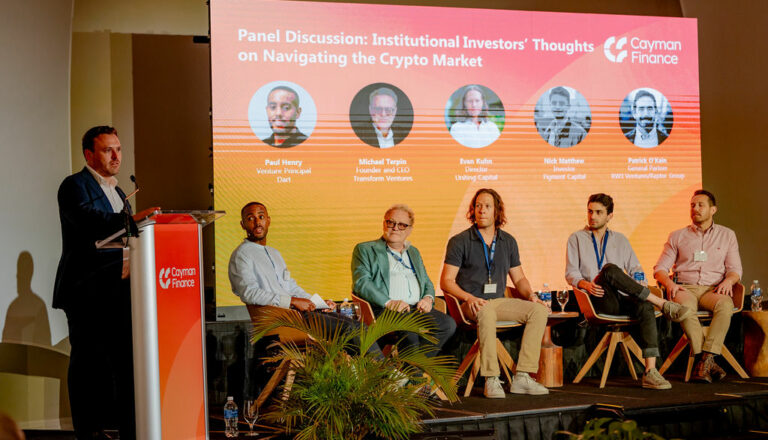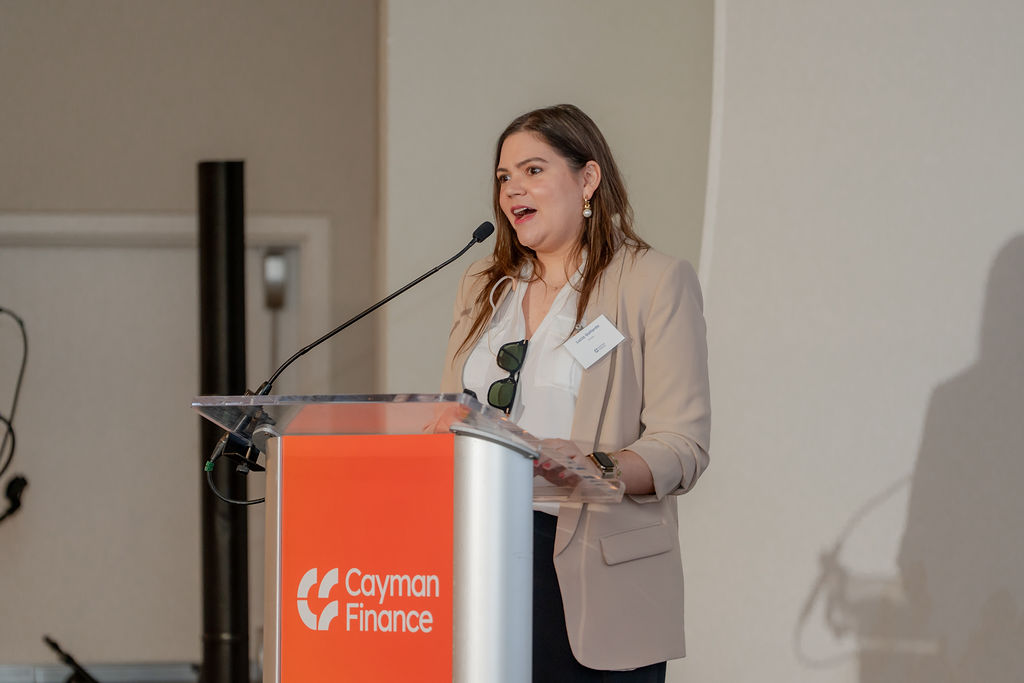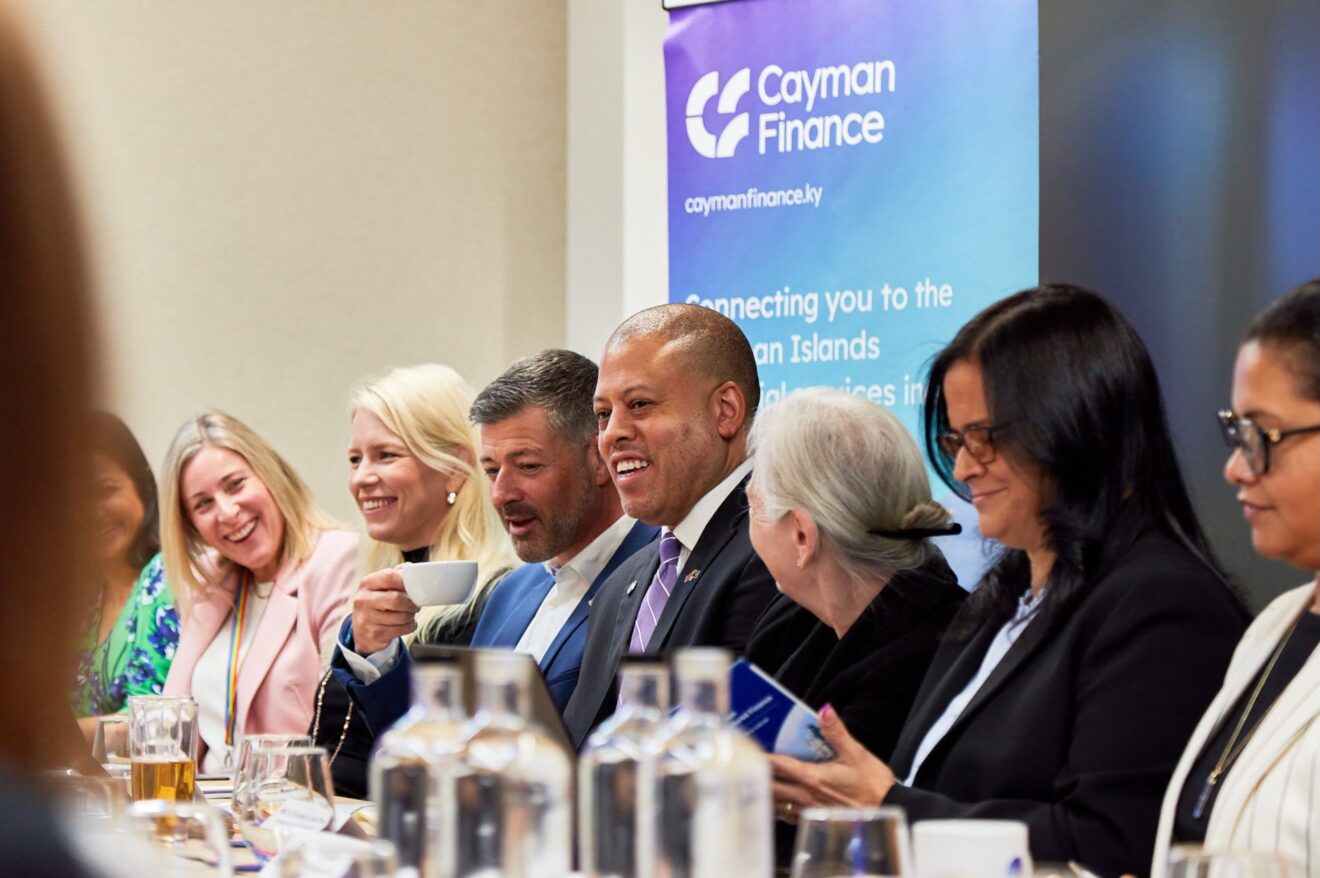
The investor panel introduced by Cayman Finance Associate Director Ed Belsey and moderated by Dart’s Paul Henry included Michael Terpin, Transform Ventures; Evan Kuhn, Uniting Capital; Nick Matthew, Figment Capital; and Patrick O’Kain, RW3 Ventures/Raptor Group.
A panel of investors in the virtual asset space called for a supportive regulatory environment to ensure the growth of blockchain technology and digital assets at the Cayman Finance member event on 29 Nov. at the Grand Cayman Marriott Resort.
Under the theme ‘Demystifying crypto: Lessons from institutional investors’ panellists gave their view of the investment landscape for digital assets and the potential for blockchain to penetrate traditional business sectors.
During the discussion regulatory clarity and support from governments and regulatory bodies to foster the growth of digital assets was one of the recurring themes.
Evan Kuhn, director, Uniting Capital praised the Cayman Islands for thinking about regulation and having a framework that companies can work within. He suggested that the presence of a framework, which is expected to become more robust over time, is a positive step in attracting crypto businesses.
Patrick O’Kain, general partner at RW3 Ventures said taking action, even if not perfect, is better than leaving regulatory uncertainty. He argued there was no one size fits all approach and some jurisdictions may decide to have a regulator dedicated to the sector while that was not really necessary in others. O’Kain pointed to the Markets in Crypto-Assets Regulation (MICA) in Europe, the UK, Singapore and Dubai as examples for more comprehensive frameworks. He also noted the importance of having a sandbox or a space to test out new technologies and regulatory approaches to see what works well.
Michael Terpin, CEO of Transform Ventures highlighted the need for consistency between regulators and heads of government in their approach to cryptocurrency. He suggested jurisdictions like Cayman have the advantage of being small and nimble to be responsive, in particular compared to the United States. He said that the Ripple case in the US showed that there is a need for regulatory adaptation to digital assets.









Importance of secure custody
The panel also delved into custody and security issues. Evan Kuhn highlighted the importance of secure custody for digital assets, advocating for the use of cold storage and qualified custodians, who may even offer insurance.
Nick Matthew, investor, Figment Capital emphasised the need for operational transparency and accessibility in custody solutions, together with additional services provided by custodians, such as access to staking or exchange connections.
Market outlook
In their market outlook the investors highlighted the growing market dominance of Bitcoin and its status as a proven store of value.
Terpin outlined the cyclical nature of crypto markets, drawing parallels to traditional markets like stocks and real estate. Anyone who invested at the start of 2014, 2018 or 2022 would have lost money, he said. Yet over the following one- to three-year period asset values recovered and made gains every time. Based on historical four-year cycles, he predicted a significant increase in Bitcoin’s value by 2025 to more than $100,000.
O’Kain, in turn, anticipates significant institutional investment in Bitcoin if a Bitcoin ETF were approved by US regulators.
“I think it will pass and it’ll get approved. And I think that that will just unlock a tonne of inflow from entities that traditionally had no access to Bitcoin. The whole wealth management industry really cannot offer any bitcoin products to the clients, and that’s a massive pot of money,” he said.
“It’s also going to provide more legitimacy to the asset class and it’s going to give people comfort that Bitcoin is an investable asset and more regulatory clarity will come out of it.”
O’Kain cited research by Galaxy Digital, which forecasted $14 billion in inflows into Bitcoin across the board in the first year after a Bitcoin ETF is approved.
Strategic experimentation

Tech entrepreneur Lucia Gallardo preceded the panel with a comprehensive look at the evolution and challenges within the virtual asset and financial regulation space.
Gallardo recommended for the Cayman Islands, and other island jurisdiction like it, to focus on leveraging the unique opportunities presented by virtual assets and technological innovations to create a competitive advantage.
She encouraged moving away from merely adopting existing financial instruments in digital form and instead, creating a culture of experimentation. This could involve launching various trials in different market segments to discover what truly works in a digital-native ecosystem.
Gallardo further suggested focusing on projects that have genuine social impact with a long-term vision that understand the evolving landscape of virtual assets.
The goal, she argued, should be to foster an environment that not only adapts to current technological advancements but is also future-proof and ready for developments that have yet to be conceptualised.
To that end the Cayman Islands should develop regulatory frameworks that are flexible and responsive to the rapidly changing technology sector, helping to protect investors while fostering innovation.


